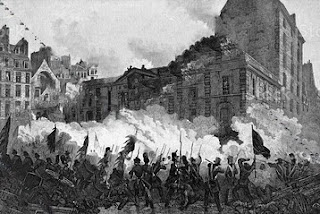-:Discussion on The Thought Fox from different perspectives:-
Powerfully conceived and executed with a brilliant, almost flawless, Hughes' The Thought Fox is one of the memorable modern poems in the English literature. Its theme is indicated in the very title and the whole poem is the vivid, concentrated imaginative image of creative thought which starts as a fox in the nocturnal forest, moving in its characteristic vulpine manner, but towards a special target, the head of the poet, in its mission to be metamorphosed as the finished thought, ready to be printed. Hughes opened both his "Selected Poems" and his "New Selected Poems" with The Thought Fox suggests that he thought of it as an overture announcing the central theme of all his subsequent poems.
I had written nothing for a year or so but that night... I wrote in a few minutes the... poem: the first "animal" poem I ever wrote.
一 Ted Hughes
Obviously, it is an animal poem; but it is also, perhaps primarily, something else. The opening words of the poem "I imagine" confirm what we have already been alerted to in the title, that this is not, primarily, a poem about a fox, but a poem about writing a poem, about the kind of thinking which produces poems, or produced them for Hughes at that stage of his career. The poet, sitting in his room alone, trying to produce an artistic poem, finds his head vacant of the idea and he looks blankly at the "blank page where my fingers move" unfruitfully. he looks out of the window, but no star throws light to reveal new thought to his dark mind. His mind is "this midnight moment's forest'; but its blankness is strangely fused with snow-flakes falling delicately "between trees". The first indication of the fox's presence in that mental forest is felt intuitively, a deeper-shadow in the shadow of night, but "something more near":
Cold, delicately as the dark snow A fox's nose touches twigs, leaf,
The poem is a blend of poetic incantation and self-revelation that embodies 'a psycho-physiological process of imaginative projection' (Ekbert Faas). Its theme is 'inspirational'. The fox metaphorically stands for the inspiration of the poetic creation. Through fox's image Hughes, thus, establishes contact between man and nature. The dynamic image is consummately developed, "now and again" and is dramatized right from the exposition to the climax. At first fox's "two eyes serve a moment" and when it approaches, it becomes focused as a single concentrated vision:
"...An eye,
A widening, deepening greenness
Brilliantly, concentratedly,
Coming about its own business..."
Now, what is its business? A natural fox is both a hunter and hunted animal. The image seems to show it as about to pounce on prey, but "enters the dark hole of the head". It is Richard Webster who gives contradictory interpretations of this line. He says, "The fox enters the lair of the head as it would enter its own lair, ..., at home in the lair of the head, safe from extinction...". Later he says, "the fox has successfully been lured into a hunter's trap", i.e. birth of a poem and death of a fox. The ambivalence is perhaps the very condition of such a poem. In spite of all these, the poet asserts in his 'The Poetry in the Making' that as long as a copy of the poem exists, every time anyone reads it the fox will get up somewhere out in the darkness".
In the fourth stanza, the fox is a silhouette against the snow. But the phrase "lame shadow" itself evokes a more precise visual image of the fox, as it freezes alterly in its tracks, holding one front-paw in the mid-air and then moves on like a limping animal. The violence packed olfactory image of the "sharp hot stink of fox" proves conventionally aesthetic and carries the evidence that Ted Hughes is not an ordinary poet.
Ted Hughes has an obsession for sheer physical power. Animal, as well as elemental ferocity, inspire him. The fresh touch of wild, living nature and the raw animal vitality and instinct of the fox has been intimately fused with the thought that would combine ultimately nature's primitive energy and the sophistication of art to make a poetic "body that is bold to come/Across clearings".





